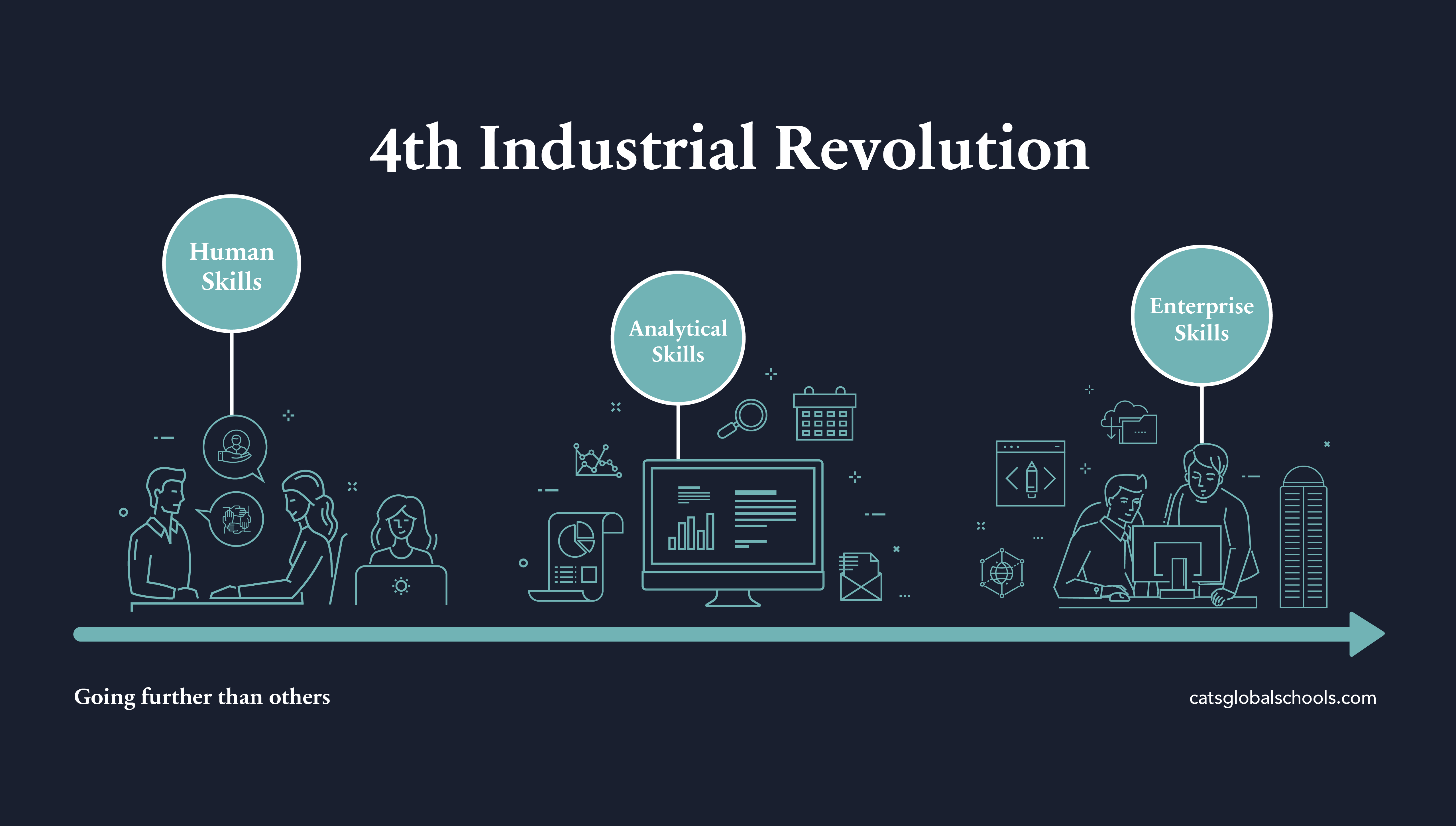“Do not let the roles you play in life make you forget that you are human.”
― Roy T. Bennett (Author)
The first two posts of our Educating for the Future blog series outlined the reason why we need to change our approach to education. The future workplace requires a very different set of skills compared to those of the past.
We believe young people need to develop nine key skills in three categories – Human, Analytical and Enterprise – to succeed in tomorrow’s world. In a recent LinkedIn poll conducted by CATS Global Schools, a resounding 71% said Human Skills were the most important for young people to thrive in the future1. In this post, we discuss exactly what we mean by Human Skills, why they are important, what it means for the future of the workplace and how CATS Global Schools is embedding the skills in the curriculum.
Computers will inevitably change the workplace
Jobs that once required people can now be done quickly by machines. Not just manual ones in manufacturing, but many others such as driving, medical, legal and copywriting. There are now practical applications of trained machine learning models that can read and interpret complex legal texts2 and write copy for blog posts3 such as this one, after having read over 10% of the entire internet and learning every day. So where does that leave us as humans, what is our purpose both individually and as a society?
The future of work in society
We work best when we are together and when our time is occupied. This does not have to be with work itself, and the future will undoubtedly be different, but there will still be a need for human skills for a long time to come. As a PwC publication, The Workforce of the future report: The competing forces shaping 2030 (2018)4 says: “Some optimists believe AI could create a world where human abilities are amplified as machines help mankind process, analyse, and evaluate the abundance of data that creates today’s world, allowing humans to spend more time engaged in high-level thinking, creativity, and decision-making.”
Developing “Human” Skills at CATS Global Schools
Karin Askham, Rector at Cambridge School of Visual & Performing Arts, talks about how the school champions global awareness and self-knowledge, one of the three “Human” skills we advocate.
Karin describes:
“One of the many initiatives our students benefit from is our Arts Lab project. Arts Lab is a collaboration where our students work on live projects with notable universities. This year, we collaborated with the University of Oxford and Cambridge to produce epidemiology illustrations. These illustrations are being used to educate communities in Sub Saharan Africa on the prevention of parasitic diseases.
“Our Arts Lab collaboration allows students to think about global initiatives and some of the challenges in the world today – to explore their creativity and to act as a catalyst for change.”
An overview of the three “Human” Skills
The three “human” skills we advocate at CGS are:
Self-knowledge
Our students should acknowledge their own strengths and weaknesses so that they can understand their contribution and how their performance might be affected by various factors, such as overworking themselves or changes in their mental health. Self-knowledge is an essential skill for personal growth, as it enables us to recognise and make sense of our experiences and emotions.
What you could do…
Working in a fast-paced software development team for a new computer game using agile project techniques to provide a big contribution to an infinitely flexible team.
Emotional Intelligence
Emotional intelligence equips our students with the knowledge and skills to manage emotions, both their own and those of others. In tomorrow’s world, our students must foster wide-ranging interpersonal relationships and networks whilst embracing diversity, communicating effectively and using methods that will inevitably not be in-person or indeed even always with a person.
A job for the future…
Training a customer service chatbot about human interactions and nuances. Working within a global organisation with no company headquarters or face-to-face meetings.
Empathy
Empathy helps us create and maintain relationships, such as the relationship between a company and its customers or employees. When employees are empathetic to customers’ perspectives, they can meet customers’ needs more effectively and gain a competitive advantage. It allows us to understand the needs and feelings of others and the differences that we might have.
Where it could take you…
Developing a strong company culture within a large global organisation, balancing the needs and wants of employees with overall performance measures.
Summary
The PwC report concludes that there will still be a need for human workers in the future – the key areas of focus will be those that technology “can’t yet crack…creativity, innovation, imagination and design skills”4. If anything, automation will amplify the significance of emotional intelligence and these skills in the workplace of the future. The key concept of what it means to ‘be human’ is exhibited across all areas at CGS of education for tomorrow’s world, including across our other two focus areas of Analytical Skills and Enterprise Skills – the subjects of the next two blog posts.
The world is rapidly changing and the teaching methods of the past need to change to meet the needs of the future. In this post we discussed Human Skills, a major factor that sets us apart from the rise of technology, focusing on empathy, emotional intelligence and self-knowledge. However, Human Skills are not the only ones that we will need; in the next post, we will look at Enterprise Skills and how we can use our human creativity to affect real change.
Sources
1. 91 people took part in the CGS LinkedIn poll asking what they felt were the most important category of skills for young people
2. Luminance, an AI-powered document review service, https://www.luminance.com/
3. Jaspar, an AI-powered written content creator, https://www.jasper.ai/
4. PWC, The Workforce of the future report: The competing forces shaping 2030 (2018)
